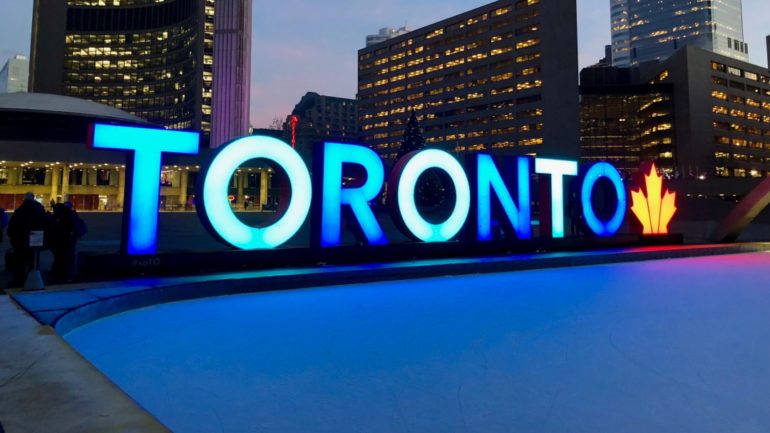
The Toronto sign is glowing blue to celebrate the city’s 184th birthday. March. 6 (Twitter: @TorontoComms)
Son Ha Tran
Torontonians recently celebrated the city’s 184th birthday, but not everyone shares the joy.
The four-day party which began on March 3 at Nathan Phillips Square honoured the transformation of old muddy Town of York into Toronto on March 6, 1834.
But for many Indigenous people, the celebration is reminiscent of the long history of colonization and oppression.
“All Canadian cities, not just Toronto were the territories that Indigenous people had offered or had been taken from them,” said Niigan Sinclair, a Professor in Native Studies at the University of Manitoba and a regular commentator on Indigenous issues on CTV and CBC.
“The history must be acknowledged because it’s the truth,” he said.
“It’s a duty of any Canadian to understand that the history of our country didn’t begin in 1867,” Sinclair said.
The feeling of “neglecting and ignoring” is what many Aboriginal people feel right now, just like what they have felt when the government spent nearly half a billion dollars on the celebration of the 150th birthday.
We will not stand for an anthem for a country which has committed genocide against our people, colonialism is ongoing today #Resistance150 pic.twitter.com/WhDKqysMXa
— Resistance 150 (@Resistance150) July 1, 2017
Kristyn Wong-Tam, councilor for Ward 27, Toronto Center-Rosedale, shared her birthday wishes to the city but didn’t forget to remind everyone of a city with a history that spans beyond just 184 years of age.
Tkaronto is much older than 184 years.
I wish to acknowledge that Toronto is the traditional territory of Indigenous people who called this land home before the arrival of settlers and many still do. Land acknowledgements are first steps toward reconciliation not the last. https://t.co/naTbiHkExl— Kristyn Wong-Tam 黃慧文 (@kristynwongtam) March 6, 2018
“Toronto celebrating its birthday can be considered an evil laugh at us (Aboriginal people),” said Shaun Crane, a cook and promotion advocate from Key First Nation, Treaty 4 Territory in Saskatchewan.
Shaun said his community feels ignored and despairs whenever it comes to celebrating the day on which their ancestors were expelled from their lands.
“We as the First People of Canada were on this land long before it was known as Canada, long before Ontario was a province, long before every other name this city had got,” he said.
The TORONTO sign is glowing blue this evening to celebrate the #CityofTO's 184th birthday! #HappyBirthdayToronto pic.twitter.com/y8420q8wEM
— City of Toronto (@cityoftoronto) March 6, 2018
Crane said the problem is not the celebration itself but with the historical ignorance towards Indigenous people.
“The reconciliation does not take place overnight,” he said. “But nothing is going to be better if everyone agrees with every celebration like this.”
Sinclair said Indigenous people don’t feel damaged just because of the celebration. They feel “neglected” and “denied” because their foundational contribution to the city was forgotten.
“The foundation of Canada is due to the inheritance of foundational contribution of Indigenous people,” Sinclair said.
“The celebration is all about how great the city is,” he said. “But never it includes the fact that our territories were stolen, our people were mistreated,”
“Then the celebration is empty and hollow of recognition,” Sinclair said.
Crane said “ignorance” and miseducation of Indigenous people’s presence in school are the biggest problems standing in the way of the reconciliation.
“We need real education,” he said. “History classes have begun but they cannot stop at ‘Indians living in Igloos’.”
Sinclair said that Canada’s promises to its Indigenous People remain elusive.
“Forgetting is a sickness for every Canadian,” he said. “The country is still struggling with all the essential tasks to reconcile the relationship between Indigenous and non-Indigenous people.”

